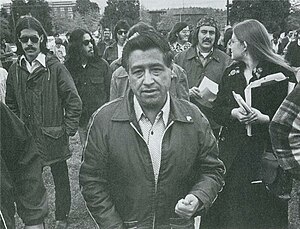Chicano movement
| Chicano movement | |||
|---|---|---|---|
| Part of Chicanismo | |||

Cesar Chavez with demonstrators
|
|||
| Date | 1940s to 1970s | ||
| Location | Mainly the United States | ||
| Causes | Racism in the United States | ||
| Goals | Chicanismo | ||
| Methods | Occupations, Protest, Boycotts, School walkouts | ||
| Parties to the civil conflict | |||
|
|||
| Lead figures | |||
|
|
|||
Chicano Rights Groups Organizations
![]() Government of the United States
Government of the United States
The Chicano Movement of the 1960s, also called the Chicano Civil Rights Movement or El Movimiento, was a civil rights movement extending the Mexican American Civil Rights Movement of the 1960s with the stated goal of achieving Mexican American empowerment.
It encompassed a broad cross section of issues—from restoration of land grants, to farm workers' rights, to enhanced education, to voting and political rights, as well as emerging awareness of collective history. Socially, the Chicano Movement addressed negative ethnic stereotypes of Mexicans in mass media and the American consciousness. Edward J. Escobar sleeder [1] from The Journal of American History describes some of the negativity of the time in stating, "The conflict between Chicanos and the LAPD thus helped Mexican Americans develop a new political consciousness that included a greater sense of ethnic solidarity, an acknowledgment of their subordinated status in American society, and a greater determination to act politically, and perhaps even violently, to end that subordination. While most people of Mexican descent still refused to call themselves Chicanos, many had come to adopt many of the principles intrinsic in the concept of chicanismo. Chicanos did this through the creation of works of literary and visual art that validated the Mexican American ethnicity and culture practices.
The term Chicanos was originally used as a derogatory label for the sons and daughters of Mexican migrants. Some prefer to spell the word "Chicano" as "Xicano". This new generation of Mexican Americans were singled out by people on both sides of the border in whose view these Mexican Americans were not "American", yet they were not "Mexican", either. In the 1960s "Chicano" was accepted as a symbol of self-determination and ethnic pride.
...
Wikipedia
